This post may contain affiliate links. Please read our disclosure policy.
How to store hard-boiled eggs to make the most of their shelf-life. Including top tips on proper storage to keep them fresh + how to store peeled and unpeeled hard-boiled eggs!
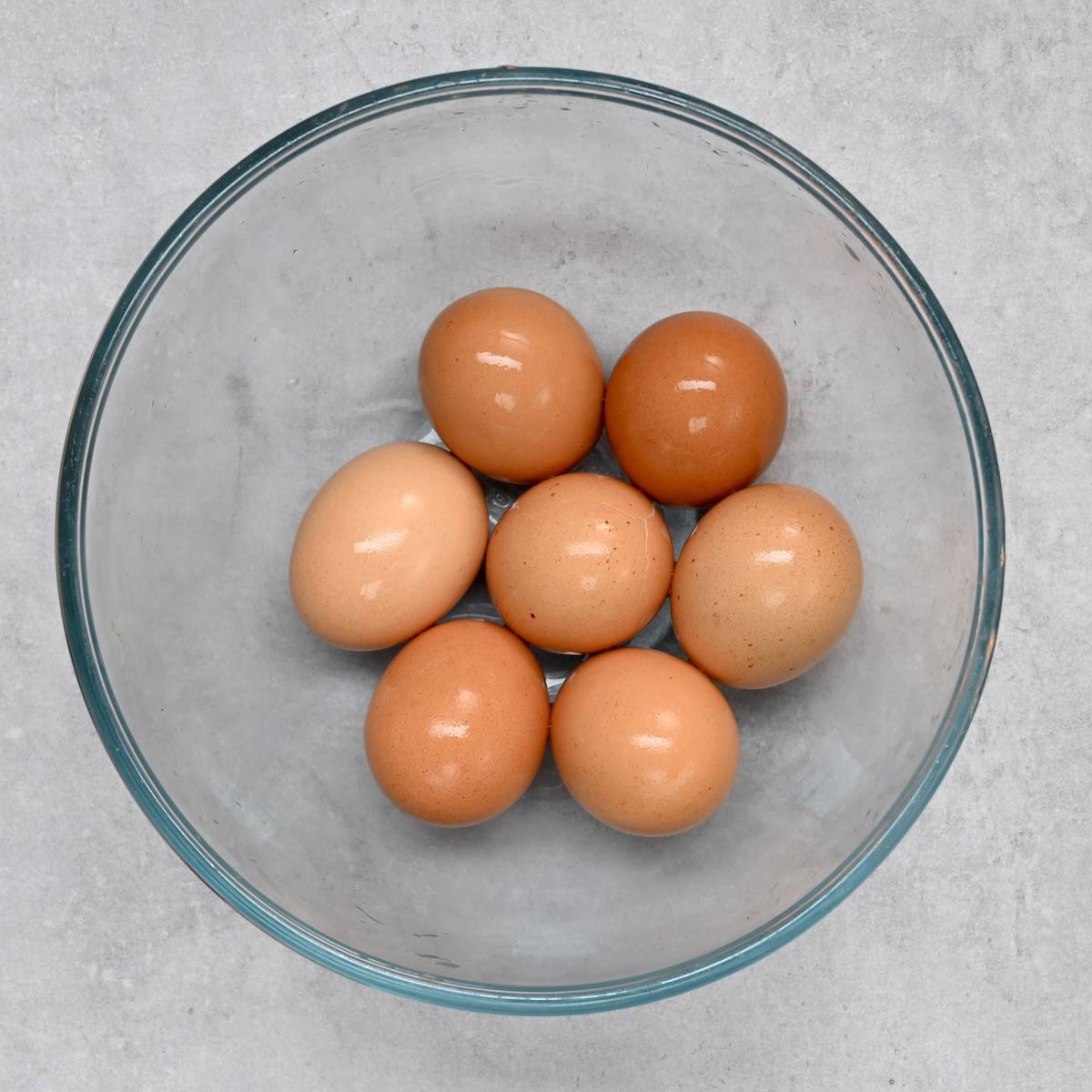
Making a big batch of meal-prep hard-boiled eggs is one of my favorite ways to prepare days of delicious snacks, egg salad, and as a protein-rich salad topper. You may also want to enjoy your leftover Easter eggs for Easter Brunch. However, the key to successful meal prep is proper storage, to avoid accidental waste.
Keep reading for my full guide on how to store hard-boiled eggs (in-peel and out-the-peel), including answers for how long do hard boiled eggs last, can you freeze hard-boiled eggs, and how to store soft-boiled eggs, too.
Want to save this recipe?
How to Store Hard Boiled Eggs the Right Way
Before storing the eggs, you first have to cook them. Luckily, there are plenty of super easy ways to whip up a large batch of hard-boiled eggs:
- Easy Peel Stovetop Hard-Boiled Eggs
- Perfect Peel Instant Pot Hard-Boiled Eggs
- Perfect Air Fryer Hard-Boiled Eggs
Allow the Eggs to Cool Down
As general good practice, it’s best to immediately transfer cooked eggs to a bowl of ice water to halt their cooking process and help cool them down quickly.
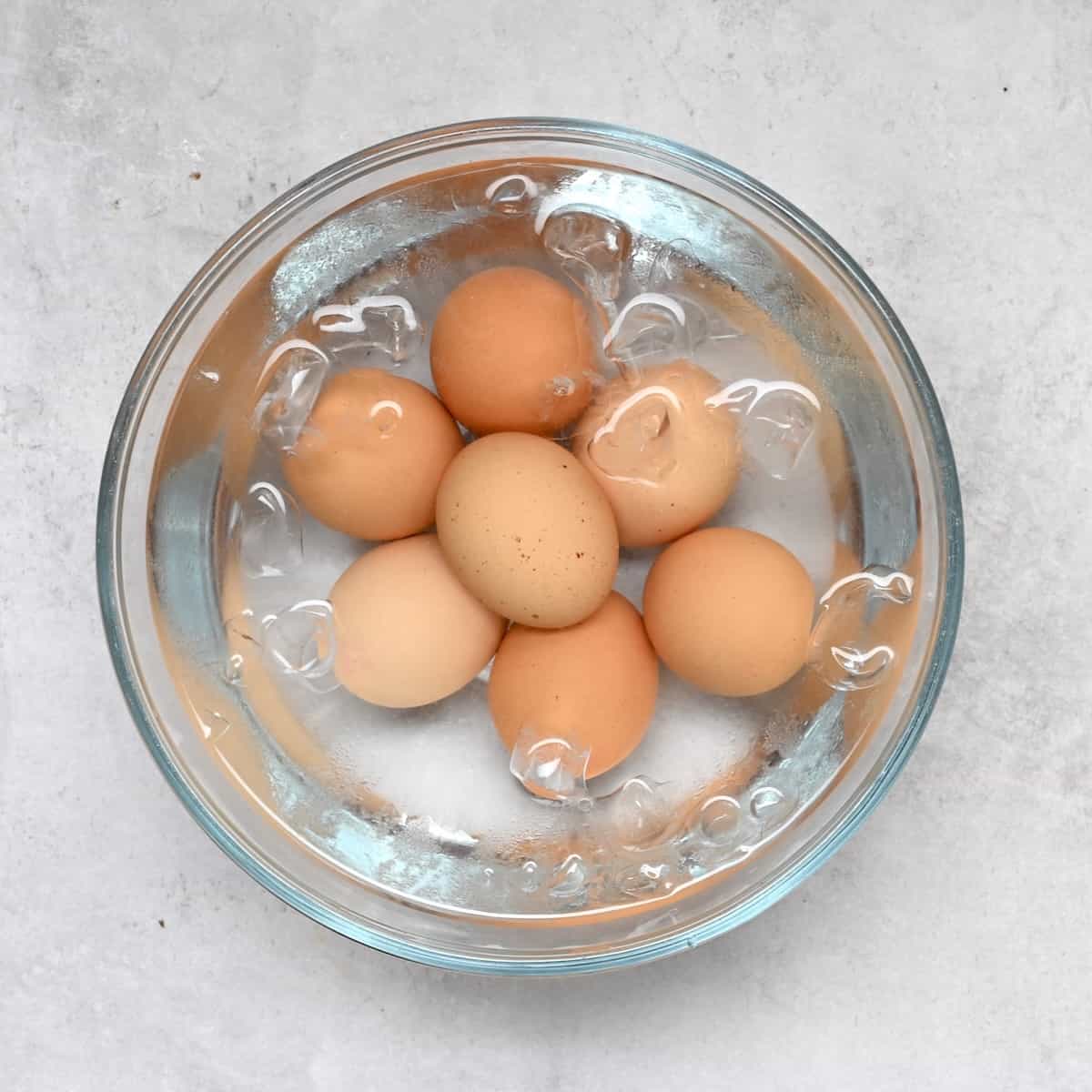
Make sure to transfer cooked eggs to the refrigerator within two hours of cooking them/them being at room temperature (1 hour if the temperature is above 90ºF/32ºC) for food safety reasons.
Storing Unpeeled Hard Boiled Eggs
The shell does a wonderful job of protecting the eggs from bacteria (and stopping them from absorbing odors). So to store unpeeled hard-boiled eggs, place them into an airtight container (box or Ziplock bag) and then keep them in the fridge.
Storing Peeled Hard Boiled Eggs
Peeling the eggs before storing generally makes them easier to peel. However, without the peel, eggs are more likely to dry out. Therefore, it’s best to store peeled hard-boiled eggs in an airtight container (box or Ziplock) between two layers of damp paper towel or submerged in cold water.
Make sure to change the water/towels every day for fresh ones.
Label the Container
Labeling the container/Ziplock with the date you cooked the eggs is always a good idea, so you know exactly how long they’ve been in the fridge. This can also reduce the risk of unintentional food wastage.
How Long Do Hard Boiled Eggs Last in the Fridge?
Generally speaking, boiled eggs will last 5-7 days when stored in an airtight container in the refrigerator (no warmer than 40ºF/4.5C). In-shell eggs tend to last the full week, whereas peeled eggs are usually best within 5 days.
To make your boiled eggs last even longer, why not make pickled eggs?!
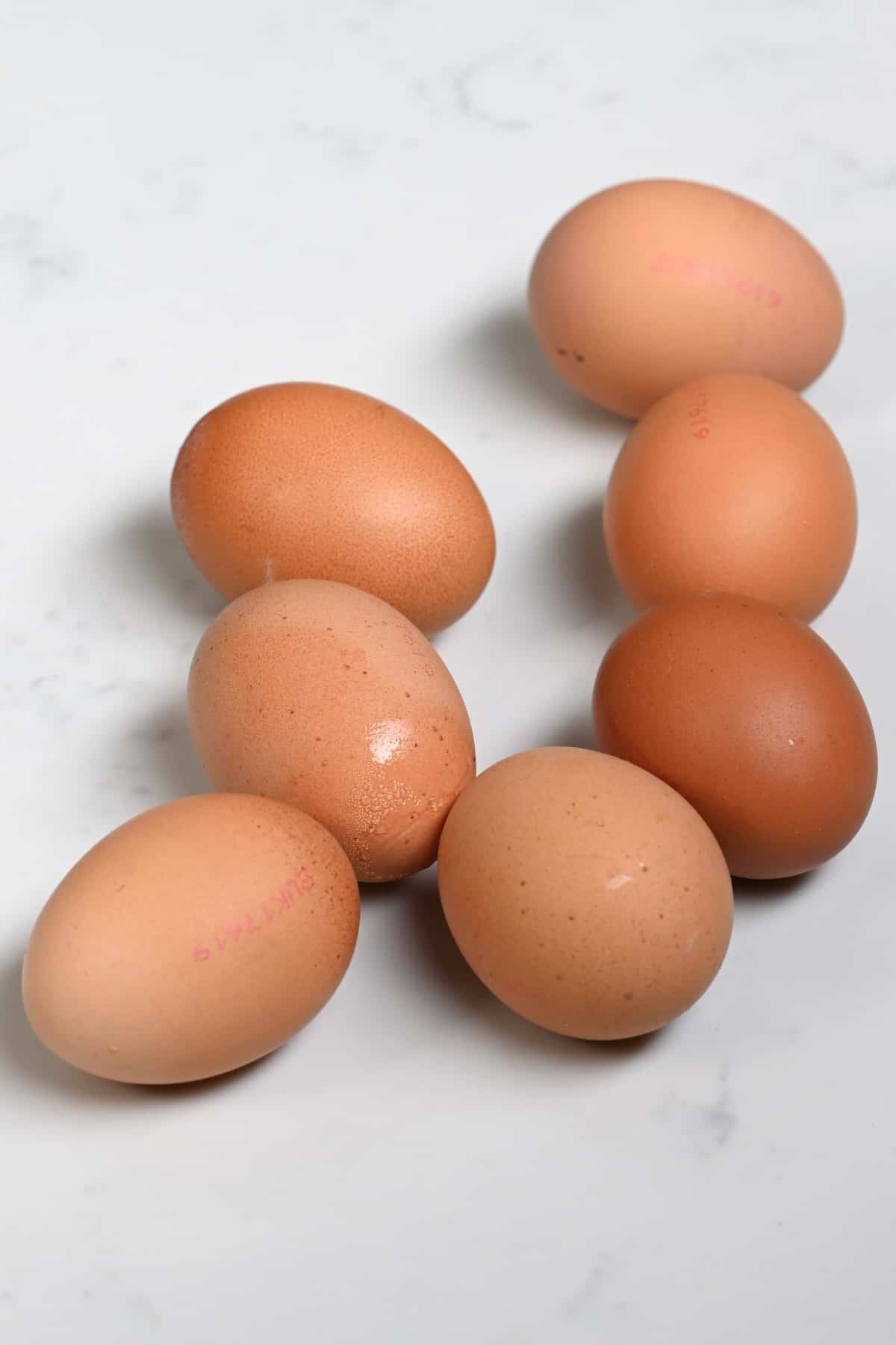
Can You Freeze Hard Boiled Eggs?
It’s not recommended to freeze whole hard-boiled eggs, as the egg whites react poorly when frozen and thawed, becoming rubbery and tough.
You can, however, freeze cooked egg yolks for up to 3 months in an airtight container.
How to Tell if Hard-Boiled Eggs Have Gone Bad
It’s usually fairly easy to tell if eggs have gone bad as they can give off an unpleasant odor (sour sulfurous smell) and look slimy/sticky or even chalky. Don’t worry if the boiled egg has a green ring around the yolk, though, that is usually a sign of overcooking rather than spoilage.
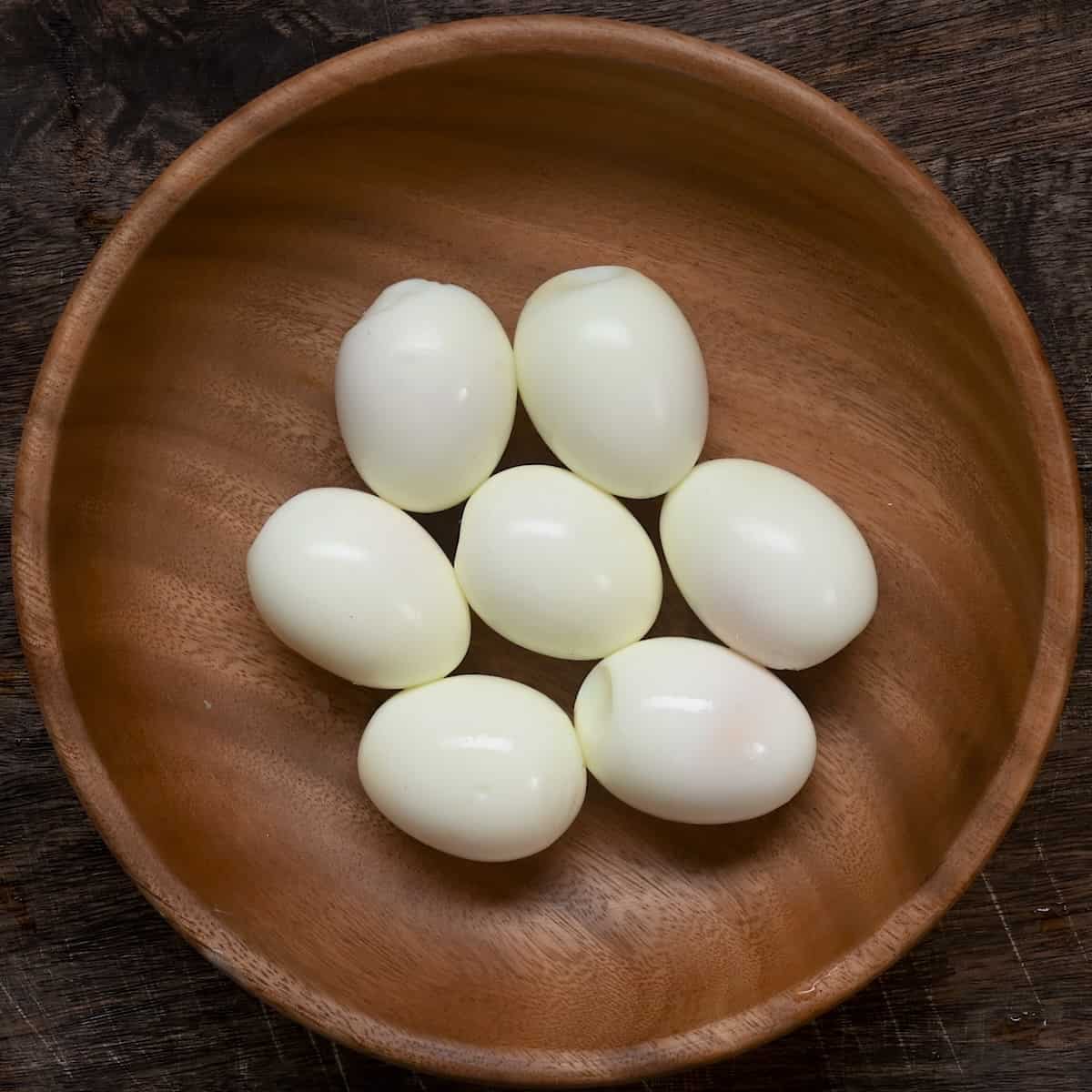
Pro Tips on Storing Hard-Boiled Eggs
- Freshness matters: The main caveat to how long hard-boiled eggs will last is how fresh they were to begin. Obviously, using older eggs results in a shorter shelf life.
- Keep the eggs whole: Sliced eggs tend to dry unless made into another recipe (like egg salad), so store them whole for the longest shelf life.
- Make sure to use airtight containers: Not only will this keep them fresher for longer, but eggs also absorb the smells around them, affecting the flavor.
- Avoid storing them in the fridge door: The temperature fluctuates a lot in this part of the fridge and can lead to early spoilage. Instead, a middle shelf is the most stable.
How to Use Hard-Boiled Eggs
- As a snack with salt and pepper,
- Over a lox bagel or avocado toast,
- Deviled egg potato salad,
- Deviled eggs,
- Creamy egg salad sandwiches,
- Pickled eggs (3 ways),
- In kedgeree,
- To make Scotch eggs,
- Turn into dip-dyed/painted Easter eggs.
Let me know in the comments below what your favorite ways to use hard-boiled eggs are. I’d also love to see your recipe recreations – tag me on Instagram @Alphafoodie!
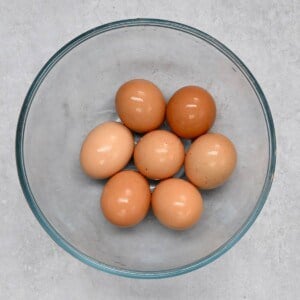
How Long Do Hard Boiled Eggs Last
Ingredients
- 4 hard boiled eggs or as many as wanted
Instructions
- As soon as the eggs are cooked, it's best to transfer them to a bowl of ice water to halt their cooking process and help cool them down quickly.
Storing unpeeled eggs
- To store unpeeled hard-boiled eggs, place them into an airtight container (box or Ziplock bag) and then keep them in the fridge. Label your container with the date you cooked the eggs, so you know exactly how long they've been in the fridge.
- In-shell eggs tend to last the full week.
Storing peeled eggs
- Peeling the eggs before storing generally makes them easier to peel. However, without the shell, eggs are more likely to dry out. So store peeled hard-boiled eggs in an airtight container (box or Ziplock) between two layers of damp paper towel or submerged in cold water.Label your container with the date you cooked the eggs.
- Peeled eggs are usually best within 5 days.Make sure to change the water/towels every day for fresh ones.
Notes
- Freezing eggs: It’s not recommended to freeze whole hard-boiled eggs, as the egg whites react poorly when frozen and thawed, becoming rubbery and tough. You can freeze cooked egg yolks for up to 3 months in an airtight container.
- Freshness matters: The main caveat to how long hard-boiled eggs will last is how fresh they were to begin. Using older eggs results in a shorter shelf life.
- Keep the eggs whole: Sliced eggs tend to dry unless made into another recipe (like egg salad), so store them whole for the longest shelf life.
- Make sure to use airtight containers: Not only will this keep them fresher for longer, but eggs also absorb the smells around them, affecting the flavor.
- Avoid storing them in the fridge door: The temperature fluctuates a lot in this part of the fridge and can lead to early spoilage. Instead, a middle shelf is the most stable.
Nutrition
Nutrition information is automatically calculated, so should only be used as an approximation.











